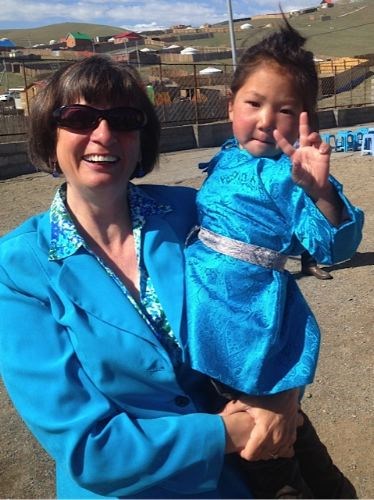Seeing a toddler in a near catatonic state standing in the middle of her unheated one-room house at about 25 below was enough to spur action into the heart of Julie Veloo, a former Prince George resident now living in Mongolia.
Veloo started the Veloo Foundation and created the Children of the Peak project that's offered a safe place for 40 little ones to stay warm and dry where they enjoy three meals a day, get new-to-them clothes and shoes and are in an environment where they can learn.
Veloo (nee Hubbell) spent her high school years in Prince George, first attending Blackburn secondary and then Prince George secondary school.
"Most of my family is still in Prince George," said Veloo, who is the younger sister of Allen Hubbell of Focus NDT and Darrell Hubbell of Hubbell Designer Goldsmiths.
After Veloo completed high school, she went to UBC where she met her husband, Chelvan, who was born in Singapore.
"We both wanted to travel and we wanted to wait until our youngest child was old enough so that if there was something wrong with him he could tell us where it hurts because you don't want to take a baby to a crazy place and we actually moved out of Canada on our youngest son's fourth birthday, May 1, 1994," said Veloo, who recently received the Governor General's medal for her work on the project. They moved to Indonesia, Australia, the United States, came back to Vancouver for two years, and then moved to Mongolia, where they have lived for the last three years.
The Children of the Peak project started when the Veloos moved to Mongolia as part of Chelvan's work for Rio Tinto, a mining company that sends him all over the world.
The company offered the couple a shipping container so they could move their stuff to Mongolia. When Veloo realized they were using only four feet of the 20 foot unit, she started making calls.
"It seemed absolutely ridiculous to me to be coming from the land of everything to the land of nothing with a free shipping container paid for with nothing in it," said Julie. "So I organized to get three and a half to four tons of clothes and blankets to be donated."
After several charitable organizations were able to take many of the items, the donations were opened up to anyone in need.
One of the men that came to get clothes, gathered three sheets, and used them to bundle large amounts of clothing to take to people who live and work at the Ulaanbaatar dump. The dump workers are those who used to have herds of animals in the outlying areas. When extreme cold hit for an extended period of time, called a zood, occurred about five years ago, it killed more than five million animals in Mongolia. It forced the traditional Mongolian herders to migrate to larger centres. Veloo explained people are registered in their town of residence in regions in Mongolia and when people had to leave their region and did not have the money to register in the new area, they are not entitled to work in the region or access that region's schools or other facilities, leaving them suffering without resources.
When Veloo suggested to the man who took the three sheets filled with clothing that he could come get more, he asked if she would like to see who the donations were going to.
"Sure, why not?" said Julie. "So we went up there and we started going from house to house giving out these clothes and it was pretty horrifying what we were walking into."
There were many one-room cement block homes or gers - a tent-like structure, with nothing in them. No clothes, one bed, maybe a blanket of sorts, a stove but no fire.
Realizing the extreme need, Veloo started a group to collect more necessities for the people working at the dump. The workers, for a small wage, picked recyclables out of the heaps of garbage and made enough money to keep their families from starving.
The third time she went up to donate clothes, she found a boy of about nine years old looking after his little sister.
"It was just unacceptable - I just hit the wall and I knew as I walked out of there I couldn't just go home, have some spaghetti, a nice bottle of wine and just sit there and think 'gee, that was tough up there at the dump today' and we started talking about a creating a daycare where the little kids could be safe and warm and then instead of the bigger kids staying home to look after the little kids while their parents went to work at the dump, the big kids could go to school."
To continue it, Veloo thought a program where the parents could get some vocational training so they could get off the dump would be nice, too.
It's all in the works now, with the Children of the Peak Sanctuary in full swing.
For more information about the foundation's work visit www.veloofoundation.com or visit their Facebook page https://www.facebook.com/groups/147686062036540/.



